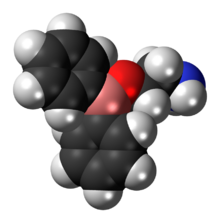Chemistry:2-Aminoethoxydiphenyl borate: Difference between revisions
imported>SpringEdit (linkage) |
(No difference)
|
Latest revision as of 20:29, 20 September 2021

| |

| |
| Names | |
|---|---|
| Preferred IUPAC name
2-[(Diphenylboranyl)oxy]ethan-1-amine | |
| Other names
2-Aminoethyl diphenyl borate
Diphenylborinic acid 2-aminoethyl ester 2-Aminoethyl diphenylborinate | |
| Identifiers | |
3D model (JSmol)
|
|
| Abbreviations | 2-APB |
| ChEBI | |
| ChEMBL | |
| ChemSpider | |
| EC Number |
|
| KEGG | |
PubChem CID
|
|
| UNII | |
| |
| |
| Properties | |
| C14H16BNO | |
| Molar mass | 225.10 g·mol−1 |
| Appearance | white |
| Density | 1.04g/cm3 |
| Melting point | 192 to 194 °C (378 to 381 °F; 465 to 467 K) |
| Boiling point | 325.3 °C (617.5 °F; 598.5 K) at 760mmHg |
| Hazards | |
| GHS pictograms | 
|
| GHS Signal word | Warning |
| H302, H315, H319, H335 | |
| P261, P264, P270, P271, P280, P301+312, P302+352, P304+340, P305+351+338, P312, P321, P330, P332+313, P337+313, P362, P403+233, P405, P501 | |
| Flash point | 150.6 °C (303.1 °F; 423.8 K) |
Except where otherwise noted, data are given for materials in their standard state (at 25 °C [77 °F], 100 kPa). | |
| Infobox references | |
2-Aminoethoxydiphenyl borate (2-APB) is a chemical that acts to inhibit both IP3 receptors[1] and TRP channels (although it activates TRPV1, TRPV2, & TRPV3 at higher concentrations).[2][3] In research it is used to manipulate intracellular release of calcium ions (Ca2+) and modify TRP channel activity, although the lack of specific effects make it less than ideal under some circumstances. Additionally, there is evidence that 2-APB acts directly to inhibit gap junctions made of connexin.[4] Increasing evidence showed that 2-APB is a powerful modifier of store-operated calcium channels (SOC) function, low concentration of 2-APB can enhance SOC while high concentration induces a transient increase followed by complete inhibition.[5][6][7]
References
- ↑ Diver, J. M.; Sage, S. O.; Rosado, J. A. (2001-11-01). "The inositol trisphosphate receptor antagonist 2-aminoethoxydiphenylborate (2-APB) blocks Ca2+ entry channels in human platelets: cautions for its use in studying Ca2+ influx". Cell Calcium 30 (5): 323–329. doi:10.1054/ceca.2001.0239. ISSN 0143-4160. PMID 11733938.
- ↑ Xu, Shang-Zhong; Zeng, Fanning; Boulay, Guylain; Grimm, Christian; Harteneck, Christian; Beech, David J. (2005-06-01). "Block of TRPC5 channels by 2-aminoethoxydiphenyl borate: a differential, extracellular and voltage-dependent effect". British Journal of Pharmacology 145 (4): 405–414. doi:10.1038/sj.bjp.0706197. ISSN 0007-1188. PMID 15806115.
- ↑ Bootman, Martin D.; Collins, Tony J.; Mackenzie, Lauren; Roderick, H. Llewelyn; Berridge, Michael J.; Peppiatt, Claire M. (2002-08-01). "2-aminoethoxydiphenyl borate (2-APB) is a reliable blocker of store-operated Ca2+ entry but an inconsistent inhibitor of InsP3-induced Ca2+ release". FASEB Journal 16 (10): 1145–1150. doi:10.1096/fj.02-0037rev. ISSN 1530-6860. PMID 12153982. https://lirias.kuleuven.be/handle/123456789/465704.
- ↑ Bai, Donglin; del Corsso, Cristiane; Srinivas, Miduturu; Spray, David C. (2006-12-01). "Block of specific gap junction channel subtypes by 2-aminoethoxydiphenyl borate (2-APB)". The Journal of Pharmacology and Experimental Therapeutics 319 (3): 1452–1458. doi:10.1124/jpet.106.112045. ISSN 0022-3565. PMID 16985167.
- ↑ Ma HT, et al. (2000) Requirement of the inositol trisphosphate receptor for activation of store-operated Ca2+ channels. Science 287:1647–1651.
- ↑ Prakriya M, Lewis RS (2001) Potentiation and inhibition of Ca2+ release-activated Ca2+ channels by 2-aminoethyldiphenyl borate (2-APB) occurs independently of IP 3 receptors. J Physiol 536:3–19.
- ↑ Ma HT, Venkatachalam K, Parys JB, Gill DL (2002) Modification of store-operated channel coupling and inositol trisphosphate receptor function by 2-aminoethoxydiphenyl borate in DT40 lymphocytes. J Biol Chem 277:6915–6922.
 |

